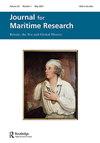海盗的问题和潜力:1670-1730年早期英属大西洋的法律变化和殖民地自治的新思想
Q3 Arts and Humanities
引用次数: 5
摘要
本文以英国海商法为研究对象,通过对海盗审判和处决的视角,探讨海军法向英国大西洋殖民地转移的挑战。17世纪,北美和西印度群岛的殖民统治者容忍海盗行为,以获取不受《航海法》限制的货物。这些交易在很大程度上被忽略了,但海盗对英国王室的侮辱越来越多,加上来自西班牙等外国竞争对手的压力,迫使英国官员打击盗版。不幸的是,由于多年来对海盗的容忍,这些海盗数量过多,英国官员无法将抓获的海盗运回英国进行审判和处决。因此,到1700年,他们不得不在美国各殖民地建立自己的海事法律裁决机构——海军部法庭,由当地总督管辖。然而,加勒比地区复杂的地理挑战和宗教影响了北美的社会法律,迫使殖民地统治者改变英国的制度,以适应他们的需要,并建立自主的法律网络。本文认为,英国海军法在大西洋殖民地的建立和维持导致了早期美国自治思想的发展。本文章由计算机程序翻译,如有差异,请以英文原文为准。
The problem and potential of piracy: legal changes and emerging ideas of colonial autonomy in the early modern British Atlantic, 1670–1730
ABSTRACT This article focuses on British maritime law to discuss the challenge of transferring Admiralty law to Britain's Atlantic colonies, considered through the lens pirate trials and executions. Colonial governors in North America and the West Indies tolerated piracy during the seventeenth century to obtain goods barred from the restrictions imposed by the Navigation Acts. These deals were largely ignored, but the increasing piratical insults against the Crown and pressure from foreign competitors, such as Spain, forced British officials to crack down on piracy. Unfortunately, years of tolerating pirates had allowed these criminals to become too numerous for British officials to transport captured pirates back to England for trial and executions. As a result, by 1700 they had to establish their maritime legal ruling body, the Admiralty Court, throughout the American colonies under the jurisdiction of local governors. However, complex geographical challenges in the Caribbean and religiously influenced social laws in North America forced colonial governors to alter the English system to fit their needs and create autonomous legal networks. This article argues that the establishment and maintenance of British Admiralty law in the Atlantic colonies led to the development of early American ideas of autonomy.
求助全文
通过发布文献求助,成功后即可免费获取论文全文。
去求助
来源期刊

Journal for Maritime Research
Arts and Humanities-History
自引率
0.00%
发文量
0
期刊介绍:
The Journal for Maritime Research ( JMR ), established by the National Maritime Museum in 1999, focuses on historical enquiry at the intersections of maritime, British and global history. It champions a wide spectrum of innovative research on the maritime past. While the Journal has a particular focus on the British experience, it positions this within broad oceanic and international contexts, encouraging comparative perspectives and interdisciplinary approaches. The journal publishes research essays and reviews around 15-20 new books each year across a broad spectrum of maritime history. All research articles published in this journal undergo rigorous peer review, involving initial editor screening and independent assessment, normally by two anonymous referees.
 求助内容:
求助内容: 应助结果提醒方式:
应助结果提醒方式:


